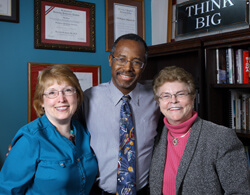NeuroLogic
May 1, 2013

There also was no Department of Neurology then—a welcome addition that came along the year after Vining started her medical training. “I got to see the formation of the department while I was a student,” she says.
Things have also changed quite a bit for pediatric neurosurgeon Ben Carson. When he came to Hopkins as an intern in 1977, there was no such thing as the current 80-hour workweek cap. “We frequently worked well over 100 hours a week,” he remembers.
He was also one of the few African-American physicians then at Johns Hopkins. “Every time I’d go into the wards,” he says, “people would think I was an orderly or respiratory therapist. I knew they were just saying that based on past experience. Once I corrected them, they never made that mistake again.”
Both doctors, after rising over the years from trainees to well-respected experts in their fields, will be retiring this summer. Retiring along with them is Carson’s longtime physician assistant (PA), Carol James.
James started her Johns Hopkins Hospital career in 1967 as a medical secretary and decided after several years that she wanted to work more closely with patients. After attending a physician assistant program at Yale, she returned and took a job in the neurosurgical service.
When Carson became the chief resident of that department, James remembers that she and Carson “really clicked.” They’ve been working together ever since.
“It’s been 31 years of collaboration, growing, learning and doing,” she says. The two have been together so long that they finish each other’s sentences. “He’s like my work husband,” James adds. “I spend much more time with him than with my real husband at home.”
Over the years that the two have worked together, Carson and James count plenty of highlights: for example, reviving hemispherectomies—complex operations that involve removing half of the brain—as a viable treatment for epilepsy and separating twins conjoined at the head.
Vining’s time at Johns Hopkins has been similarly prolific, she says. Through a longtime collaboration with John Freeman, who created and directed the pediatric neurology service, the two wrote a book that remains the authoritative guide on pediatric epilepsy for families and has been published in several editions.
“We helped empower families and change the perception of what epilepsy in children is all about,” she says. “The majority of people with epilepsy do fine, and that’s really been reflected in our books.”
She and Freeman helped revive hemispherectomies as well, showing that they can be safe and effective for patients with intractable seizures. The pair also helped popularize the ketogenic diet for epilepsy.
Pediatric neurology and neurosurgery has grown tremendously since Vining, Carson and James started their tenures here. Practically loners in their departments at the beginning, now there are three pediatric neurosurgeons and eight pediatric neurologists, all considered leaders in their field. Several other specialists now support the departments, including pediatric vascular neurosurgeons and pediatric peripheral nerve neurosurgeons. Six PAs strengthen pediatric neurology and neurosurgery even further.
As the three step down, the departments are helping to fill the void with new experts and helping existing faculty move up, including George Jallo, a world renowned neurosurgeon who is now the director of pediatric neurosurgery and will now hold Carson’s former title, the Evelyn Spiro, R.N. Professor in Pediatric Neurosurgery.
“These three have made incredible contributions, providing expertise and helping children in ways no one had dreamed of 30 years ago,” says Henry Brem, director of the Department of Neurosurgery. “They have created some of the best neurology and neurosurgery programs in the nation, which are flourishing.”
